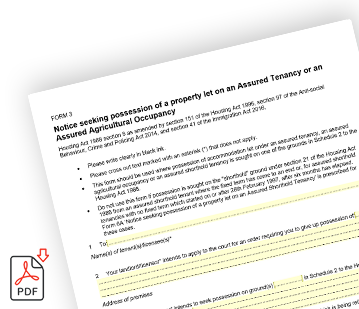It is vital a Section 8 Notice is served correctly to avoid costly and frustrating delays.
For example, if a landlord is basing their claim for arrears of rent, then failure to follow the correct process can be costly and result in delays.
What is a Section Notice for?
This is the first step to gaining possession of a rental property during a tenancy. This can only be used if there are grounds for eviction such as rent arrears. The landlord must state the reason for seeking eviction in the Section 8 Notice.
When is a Section Notice applicable?
The Section 8 Notice is applicable if a landlord is renting a property under an Assured or Regulated tenancy and wants to take possession.
Under an Assured or Regulated tenancy there must be grounds under the Housing Act 1988 to serve a Section 8 Notice.
Under an Assured Shorthold Tenancy a Section 8 Notice can be served provided there are mandatory or discretionary grounds.
Mandatory Grounds
The Section 8 Notice must state the grounds upon which possession is being sought. If the mandatory grounds are met the court must make an order for possession.
A well drafted tenancy agreement will always state that possession may be sought under these grounds as the tenant must know this before the tenancy commences.
Discretionary Grounds
The Section 8 Notice can state the discretionary grounds upon which possession is being sought. If discretionary grounds are met the court can make an order for possession or afford the tenant another chance. The landlord will often have to meet the legal costs when this happens.
What is the Required Notice Period?
The amount of notice a landlord is required to give differs according to the grounds they are citing on the Section 8 form. Ground 2 for example, requires a minimum of 2 months’ notice but grounds 8, 10, 11, 12, 13, 14, 15, 16 and 17 only require 2 weeks’ notice.
What happens next?
The Section 8 Notice must clearly state the date on which the notice expires.
This would be the date the arrears of rent must be paid by or the date vacant possession should be given. In the vast majority of cases this does not happen and further action is needed.
The landlord can start court possession proceedings the day after the notice expires.
This process is started by utilising court forms N5 and N119 and paying the appropriate court fee.
Important notes
Landlords must ensure they have put the tenancts deposit in an appropriate tenant deposit protection scheme. The landlord can be fined three times this amount and this could wipe out any rent arrears preventing possession.
Landlords should make reasonable efforts to remind tenants to clear their rent arrears.
Landlords should ensure they meet the terms of the tenancy agreement to avoid a court dismissing an application for possession where the tenant has withheld rent for this reason.
What happens if the tenants still do not leave?
If a landlord gets a court order for possession and the tenants still do not leave the landlord must apply to the court bailiff to remove them by force.

